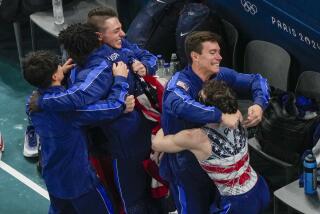Olympic Moments to Watch For
- Share via
Hockey fans with real jobs are best advised to hunker down for the Nagano Winter Olympics with a healthy VCR and a boxload of blank videocassettes.
“Wayne Gretzky After Midnight” is the unofficial viewers’ theme for these Winter Games, the first to allow National Hockey League professionals to compete for the men’s hockey gold medal. CBS has promised live coverage of all U.S. hockey games for its East Coast audience--normally a good thing--except that the time difference between Nagano and New York is 14 hours.
Thus, most U.S. games will air on CBS’ late-night show, with the West Coast receiving a tape-delay of the East Coast telecast, to start anywhere between 11:35 p.m. and 1:05 a.m.
Prime time, of course, is reserved for figure skating, Alpine skiing, figure skating, luge, figure skating, figure skating and figure skating. Television viewers of America, brace yourself for Everything You Ever Wanted to Know About Tara Lipinski . . . and Much, Much More.
A day-by-day rundown of CBS’ featured coverage:
Feb. 7, Saturday
Men’s downhill: American Tommy Moe attempts to defend the surprising gold medal he won four years ago in Lillehammer, confronted by two sobering bits of knowledge: 1) No man has ever repeated as Olympic downhill champion, and 2) Moe has not had a top-five finish in a World Cup downhill competition since 1994. Austria’s Hermann Maier is the downhiller to watch in this glamour event of skiing; the former bricklayer has built a commanding lead atop the men’s 1997-98 World Cup overall standings.
Feb. 8, Sunday
Snowboarding: Touting itself as skiing’s younger, hipper cousin, snowboarding makes its debut as an Olympic medal sport with American Mike Jacoby favored in the men’s giant slalom. Jacoby, a thrill-seeker from Bellevue, Wash., has parachuted out of helicopters to board down volcanic peaks in Siberia. At 28, he is the Methuselah of the sport--a 10-year veteran of the professional circuit and a two-time World Cup champion.
Feb. 9, Monday
Women’s super giant slalom: A demanding combination of downhill speed and giant-slalom technical finesse, the super G is Alpine skiing’s most unpredictable discipline. That said, it would still be unwise to bet against Germany’s Katja Seizinger, a bronze medalist in 1992. Seizinger is the world leader in this event, and the top-ranked overall women’s skier at the moment. This could be the first of multiple gold medals for Seizinger in Nagano.
Feb. 10, Tuesday
Pairs figure skating: What was most noteworthy about the gold medal won by Canada’s Barbara Wagner and Robert Paul in pairs figure skating at Squaw Valley 1960? It was the last time an Olympic pairs competition was won by a team not representing Russia or the Soviet Union. Russia has two strong pairs entered this year--1996 world titlists Marina Eltsova and Andrei Bushkov, and 1997 world bronze medalists Oksana Kazakova and Artur Dmitriev. But the reigning world champions hail from Germany--Mandy Woetzel and Ingo Steuer, who hope to become their country’s first Olympic figure skating champions since Katarina Witt.
Feb. 11, Wednesday
Women’s luge: In 30 years of Olympic competition, 81 medals have been awarded in one-man, one-woman and two-man luge. Total medals won by Americans: zero. Cammy Myler attempts to put an end to that sorry track record in her third Olympic run. Myler, of Plattsburgh, N.Y., is a six-time national champion with best-ever finishes for a U.S. woman luger at the 1992 Olympics (fifth) and the 1995 world championships (fourth).
Feb. 12, Thursday
Men’s hockey: With time running out in its quest to become Sport of the ‘90s, hockey has gone the “Dream Team” route in these Games, borrowing from the NBA’s success-through-infiltrating-the-Olympics playbook. The United States, led by NHL stars Brett Hull (St. Louis Blues), Mike Modano (Dallas Stars) and Chris Chelios (Chicago Blackhawks), opens group play against 1994 Olympic champion Sweden and NHL scoring leader Peter Forsberg of the Colorado Avalanche.
Feb. 13, Friday
Women’s downhill: Foremost among the lessons gained at the 1994 Olympics: Picabo Street is not a cable-TV children’s program. With a scintillating performance and a silver medal in this event at Lillehammer, Street became an icon of U.S. skiing, going on to win World Cup titles in 1995 and 1996 as well as the 1996 downhill world championship. She missed most of 1997 after undergoing surgery to repair torn knee ligaments, but returned to the World Cup circuit in December with promising initial results. Street will be the focus again here, with Germany’s Seizinger and Renate Goetschl of Austria among the favorites.
Feb. 14, Saturday
Men’s figure skating: Also known as the Night of the Quad Squad. The practice of launching--and, with any luck, landing--quadruple jumps has become the rage in men’s figure skating. Defending world champion Elvis Stojko of Canada and Russian rivals Alexei Yagudin (1998 European champion) and Ilia Kulik (1995 European champion) all pack the quad in their arsenals. Five-time American champion Todd Eldredge may need one, too, if he is to break through for a gold or silver medal.
Feb. 15, Sunday
Ice hockey: Canada vs. the United States in a possible preview of the men’s hockey gold-medal game. Matchups to watch: Wayne Gretzky, skating for Canada and attempting to score against his New York Rangers teammate, U.S. goaltender Mike Richter; Philadelphia Flyers linemates Eric Lindros (Canada) and John LeClair (U.S.) banging bodies for a loose puck in the corner. With virtually the same roster, Team USA upset Canada in 1996 to win hockey’s World Cup.
Feb. 16, Monday
Ice dancing: Is it sport ... or is it the Ice Capades? With the TV ratings that ice dancing regularly pulls in, does it really matter? Four-time world champions Oksana Grishuk and Evgeny Platov of Russia are attempting to become the first dance team to win the gold medal in consecutive Winter Games. Elizabeth Punsalan and Jerod Swallow, fifth at the 1997 world championships, bid for the United States’ first dance medal since Colleen O’Connor and James Millns won the bronze in 1976.
Feb. 17, Tuesday
Freestyle skiing: Freestyle aerials are as close as the Winter Games get to gymnastics, only with warmer clothing. The United States has gold-medal contenders in both men’s and women’s divisions--Eric Bergoust, who placed second at the 1997 world championships barely a month after shattering his collarbone in practice, and Nikki Stone, women’s world champion in 1995.
Feb. 18, Wednesday
Women’s figure skating: They don’t make figure skating rivalries like Tonya Harding vs. Nancy Kerrigan any more, not since they eliminated the lead pipe-to-the-knee from the ladies short program. In its place for 1998 is Michelle Kwan vs. Tara Lipinski: kinder, gentler, complete with giggling hugs on the medals podium. The short program leads CBS’ prime-time coverage this night, followed by the long program Friday evening.
Feb. 19, Thursday
Speedskating: With Bonnie Blair’s retirement after Lillehammer, some poor woman was going to be saddled with the burden of being “The Next Bonnie Blair”--and Chris Witty drew the short straw. Witty, a native of West Allis, Wis., placed only 23rd in the women’s 1,000 meters in 1994, but broke the world record in the same event last fall. She will be one of the favorites for the gold medal at 1,000 meters in Nagano along with Xue Ruihong of China.
Feb. 20, Friday
Women’s figure skating: Can Kwan possibly improve on her long program performance at the 1998 U.S. championships, where she received eight perfect scores of 6.0 out of a possible nine? Can Lipinski bounce back from despair--i.e., second place--at the ’98 nationals and reclaim her standing as world’s best women’s figure skater at the grizzled age of 15? Can Nicole Bobek, 1995 U.S. champion, win the bronze and complete an American sweep of the ladies figure skating medals? Stay tuned is the customary response here, but most of America will be doing that already.
Feb. 21, Saturday
Men’s hockey: Two ready-for-prime-time story lines could collide in the gold-medal game: 1) The Americans chasing their first Olympic gold medal since their “Miracle on Ice” run of 1980; 2) Canada, after 46 years, finally reclaiming Olympic mastery of its national pasttime. CBS would prefer sticking to those--although dark-horse challenges by 3) Sweden, 4) Russia or 5) Finland could always muck up such best-laid plans.
The Winter Olympics will air on CBS from Friday (opening ceremony) to Feb. 22 (closing ceremony), filling all three hours of prime time every night, plus additional coverage during the day and late-night. There also will be some coverage on TNT cable.
More to Read
Go beyond the scoreboard
Get the latest on L.A.'s teams in the daily Sports Report newsletter.
You may occasionally receive promotional content from the Los Angeles Times.






